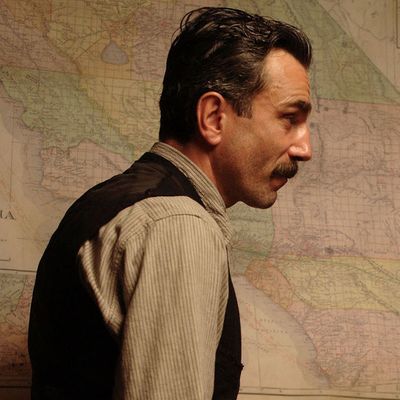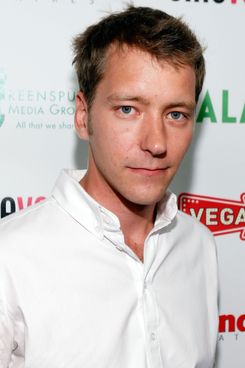
Box-office records inevitably get broken and Oscars can go missing; perhaps the surest mark of a great film is how many urban legends spring up in its wake. (Just ask that munchkin.) Paul Thomas AndersonÔÇÖs There Will Be Blood is only ten years old, but it already has its own defining myth. As the story goes, Daniel Day-Lewis was so committed to the madness of his Method that the young actor who was supposed to play Eli Sunday got freaked out and quit the film ÔÇö which required Paul Dano, who was already playing EliÔÇÖs brother Paul, to step in and take the dual role. ItÔÇÖs one of those anecdotes that makes the rounds in lists like ÔÇ£7 Famous Actors Who Were Genuinely Terrified On Set,ÔÇØ each of them linking to the ones that come before.
As far as anyone can tell, the rumor dates to single line in a New York Times Magazine story from November 2007. Writer Lynn Hirschberg reports that the original Eli had to be replaced a few weeks into production, and after outlining some of the pressures that Day-Lewis has been known to put on his co-stars, she notes that ÔÇ£there are reports that the first actor suffered from intimidation.ÔÇØ Hirschberg also included the official line ÔÇö that the actor just ÔÇ£wasnÔÇÖt the right fit,ÔÇØ as Anderson put it ÔÇö but the hint of behind-the-scenes psychodrama proved to be irresistible gossip.
ÔÇ£ThereÔÇÖs something about that story that I understand is super compelling,ÔÇØ says Kel OÔÇÖNeill, the man who originally played Eli. He chalks up its persistence to the hunger we have for stories about great artists. ÔÇ£It gets at something that we collectively want to believe about Daniel, or anybody who is really good at what they do,ÔÇØ he says. ÔÇ£That theyÔÇÖre somehow remote from us. TheyÔÇÖre special and different, and in a way they deserve to be held to a different set of standards, because what they give to the world is so incredible.ÔÇØ
OÔÇÖNeill is skeptical that, ten years later, thereÔÇÖs anything he can do to correct the record, and heÔÇÖs probably right. But if youÔÇÖre curious, hereÔÇÖs what actually happened ÔÇö at least, as far as OÔÇÖNeill can remember.
OÔÇÖNeill didnÔÇÖt dream of becoming an actor. He describes it as something he fell into; he did some plays as a kid and then just kind of kept doing it. ÔÇ£Acting was like an assumption on my own part about who I was, and what I did,ÔÇØ he says. After supporting roles in XX/XY and Domino, he taped an audition for There Will Be Blood, but didnÔÇÖt hear anything back for a year.

After getting the part, he arrived on the West Texas set a few weeks early at AndersonÔÇÖs instruction: ÔÇ£The idea was to soak up the isolation.ÔÇØ As soon as production began, it was clear that something wasnÔÇÖt working. ÔÇ£You know,ÔÇØ he says. ÔÇ£You just know.ÔÇØ But itÔÇÖs hard for him to put his finger on.
ÔÇ£Filmmaking is so alchemical that sometimes certain factors donÔÇÖt add up,ÔÇØ he says. ÔÇ£Some directors IÔÇÖve worked with ÔÇö who very few people would say are better directors than Paul ÔÇö just had a way of making me feel comfortable. For some reason, even though every other actor I know had a relationship with Paul that was super positive and where they did their best work, that just didnÔÇÖt happen with me. I would attribute that primarily to a failure on my side: An actor should, with every ounce of their humanity, be attempting to give the director what he or she wants. And I recall going in and out on whether I could really do that.ÔÇØ
Two or three weeks in, OÔÇÖNeill saw that heÔÇÖd been removed from the upcoming shooting schedule. His days were suddenly empty. ÔÇ£I remember a good deal of solitude, thinking a lot about what I was gonna do next,ÔÇØ he says. ÔÇ£I knew that this was a critical juncture in my life and if there were any goals that I had been sublimating to pursue acting, I had to go after those.ÔÇØ His premonition was correct: He was called into a meeting with Anderson and producer JoAnne Sellar, and fired.
He reiterates that his departure had nothing to do with Daniel Day-Lewis. ÔÇ£It wasnÔÇÖt drinks every night with Daniel on set, but thereÔÇÖs a fundamental decency to the way he comports himself in those environments that gets lost in the shuffle of these rumors,ÔÇØ he says. ÔÇ£After we did our first scene, he came over, shook my hand and said ÔÇö sort of in character and sort of not ÔÇö ÔÇÿWelcome.ÔÇÖ And that sets a tone where that person isnÔÇÖt your enemy. I would be cautious now, especially when heÔÇÖs not going to do this anymore, about making him so mythical that thereÔÇÖs no acknowledgment of the human being there.ÔÇØ
OÔÇØNeill acted in a few films after There Will Be Blood, but in retrospect, getting fired was the thing that proved he needed to find something else to do with his life. ÔÇ£ThereÔÇÖs a lot of fun to be had in acting, but itÔÇÖs not a craft I wake up with the desire to do everyday,ÔÇØ he says. ÔÇ£Daniel Day-Lewis, there was no question what that guy was gonna do: HeÔÇÖs 100 percent an actor. He lives and breathes for it. ItÔÇÖs not just about joy, itÔÇÖs about hands in the muck.ÔÇØ
For OÔÇÖNeill, that muck turned out to be experimental filmmaking. He spent his late 20s putting himself through an unofficial film school; now he and his wife Eline Jongsma are an award-winning duo who describe themselves as ÔÇ£working at the intersection of documentary film, art, and technology.ÔÇØ TheyÔÇÖre currently a month into a yearlong Sundance residency at the Technicolor Experience Center, where theyÔÇÖre making a new piece of virtual-reality cinema.
ÔÇ£I donÔÇÖt want to be all TED Talk about it and say that ÔÇÿfailure is actually necessary for success,ÔÇÖÔÇØ he says. ÔÇ£Because if I look at where I am in my life, I work in a very specific subsection of a very specific subsection of filmmaking. But anybody should be able to identify with failure. If you meet someone who hasnÔÇÖt experienced failure, you should immediately run away from them.ÔÇØ
Near the end of our interview, I asked OÔÇÖNeill if the version of There Will Be Blood that was released was much different than the one he saw being filmed. He couldnÔÇÖt answer that, he said, because he hasnÔÇÖt seen it.
After the firing, I stopped watching anything that was made after mid-period John Carpenter, he says. The illusion was popped, and if you cant be lost in the illusion of a movie  Its like, I could see the craft-service table.
OÔÇØNeill has since thrown aside his self-imposed limitations, and he says heÔÇÖs sure heÔÇÖll see There Will Be Blood eventually. But he hasnÔÇÖt been able to avoid the film entirely. A few years ago, he walked into a video store that was playing it on the monitors. ÔÇ£I was like, Looks like a good movie.ÔÇØ


